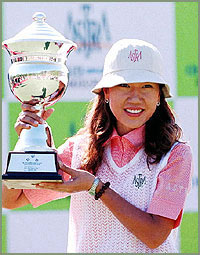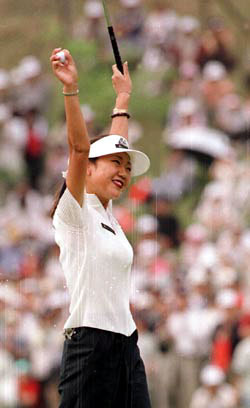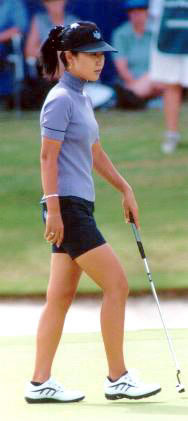 |
 |
 |
 |
 |
 |
Takefuji 2003: Kang's the Thang
Soo Yun Kang has been a big fish in Korean golf for quite some time.
Even as an amateur, she made a lot of noise, representing Korea in the
World Amateur Championship in 1996, where along with teammate Hee-Won
Han she led her country to a (then) surprising victory. Turning pro in
1997, she quickly established herself as one of the top pros on the KLPGA.
In 2000, she won three times, was named the Player of the Year, and looked
longingly towards the LPGA tour.
For you see, in the time since she had turned pro, a revolution had taken
place. That revolution's name was Se Ri Pak, a player who had turned pro
only a year before Kang. Pak went over to the LPGA in 1998 and was such
a phenomenon that she literally overwhelmed all other sports stories in
the country that year. The next season, Mi Hyun Kim, another top Korean
pro, tried her luck in America, with lesser but still impressive results.
Whereas a few years previously, Korean lady pros would not have even considered
going over to America, now it suddenly became the ultimate goal of almost
any top pro.

Soo Yun holds one of her KLPGA
trophies

Another moment of victory
in Korea
Soo Yun was no different. With her success not only in Korea, but also
against top international players who had chosen to play tournaments in
Korea, she felt sure that she could become as big a success in America
as Se Ri and Mi Hyun had been. In an article in a major Asian golf publication,
she boldly predicted that she would go over to the LPGA and do just that,
using the words 'when I become successful', not 'if'. And so, she packed
herself up in 1999 and headed over to America, where she tested the waters
on the Futures Tour in a few events. She did not win any of them, but
felt this was merely a formality I'm sure. In late 2000, she particpated
in LPGA Q School. Signs were looking good for her when she shot a 65 in
the Q-School sectional, setting a record for low score on the Venice,
FL, course in that tournament.
But a funny thing happened on the way to stardom. Soo Yun quite frankly did not do that well at Q School, finishing tied for 49th. This was good enough to get her conditional status on the LPGA, but even in 2001, when there were more tournaments than nowadays, this meant she would not be playing in a lot of LPGA events unless she Monday qualified for them. Kang also had another problem to deal with, namely that most Korean players, no matter how much success they have previously had, take a little time to get acclimated to the American culture, the different greens and course setups, the amount of travel, and the other challenges of living so far away from home. Even Se Ri had taken a dozen tournaments to break into the top ten for the first time. It would be quite a challenge for her to break herself in when it was tough to even get into a tournament in the first place.
As it turned out, she only made it into three fields in 2001, and only made the cut in one of them. That finish was a rather inglorious 42nd place tie. Not exactly the results she was expecting after having played so well in Korea just the year before. Then came the 2001 Q-School, which was a disaster: she failed to get any kind of standing on tour. And so, chastened, Kang returned to Korea, where she again quickly became one of the top players on the KLPGA tour.
But despite finishing third on the KLPGA money list in 2002, a hunger was gnawing at Kang's soul. She knew she had the ability to compete on the LPGA, but she needed to be exempt to do it, for having to play as a conditional player was just too rough an existence for a newcomer to the country. Perhaps a lesser player would have shrugged and accepted that playing in America was not for her. It was not unheard of that a top player would not want to try out for the LPGA. Il Mi Chung, who had finished second on the KLPGA in 2002, has made it known she has no interest in the LPGA, preferring to live in Korea. But that was not what Kang wanted. She still had something to prove.
And so, she returned for the 2002 Q School. Easily making it into the
finals, she went on to finish in a tie for seventh, at last making her
exempt card. Now the real test began.
